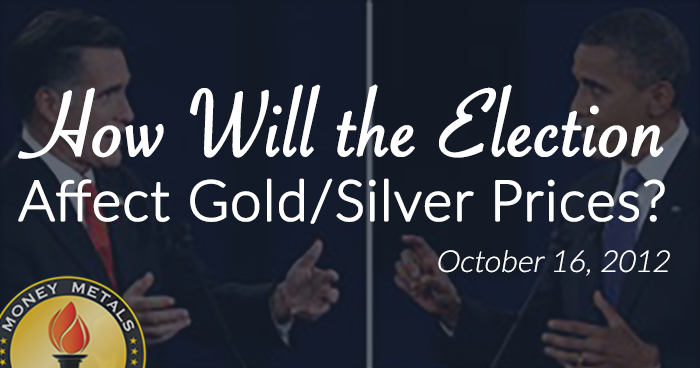Precious metals prices moved modestly lower in overseas trading on Monday to open the week, carrying over downward momentum from price declines posted in the U.S. last Friday.
Gold fell $26/oz and closed at $1,756 last week - down 1.4%. Silver lost $1.08/oz (-3.1%) on the week - finishing at $33.52. Platinum dropped $43/oz (-2.5%) and settled at $1,660, while palladium performed most poorly and gave up $21/oz (-3.2%) to close at $637.
The momentum generated by the anticipation and then the actual announcement of QE3 took gold from $1,525 to just below a key level at $1,800 and silver from $26.50 to just below the important $35 level. The markets now await a new catalyst to push them higher. A further price correction cannot be ruled out until world events jump-start speculative buying once again.
The Election and Its Likely Effect on the Markets
The upcoming presidential election is just under three weeks away, and Money Metals customers are asking our Specialists for their thoughts on the potential outcome. The election will certainly move all markets to some degree. The trouble is in guessing how much and in what direction.
As discussed in last week's Market Update, correctly timing buy or sell decisions in the very short term is statistically unlikely and counter-productive. Most investors would do better focusing on the long-term trend in the market, rather than trying to pick market tops and bottoms in any given 1 to 2 month time window.
We focus instead on the medium-term and longer-term. And looking further ahead, there is very little reason to expect the election will result in any real fundamental changes. We anticipate continued massive debts, deficits, and the perceived need for the Federal Reserve to continue acting as the buyer of last resort for Treasuries.
While almost everyone is focused on the presidential election, it is the Congressional election that is perhaps most significant long term. After all, Congress controls spending. Getting debt levels and deficits under control will require a Congress prepared to make dramatic cuts – and a major shake-up in the body's current composition.
That is unlikely to happen.
To ensure majority control of Congress, Republicans need to take the Senate. According to RealClear Politics, Republicans will need to win races in 8 of the 11 states currently deemed to be toss-ups. That is a tall order, but success would grant them only a simple majority. They would remain a long way from the super-majority needed to pass controversial budget cuts.
We know from the first-hand experience of the last decade that official Republican control in Washington does nothing to shrink the size of government (to the contrary). We're sorry to say that the outcome going forward would be no different.
"If Obama gets re-elected, we can expect higher prices in the precious metals market" />
The reality is that there is no real appetite even among Republicans to do anything dramatic. Republican leaders are talking about trillion-dollar spending cuts spread over 10 years, while Congress continues to run deficits of a trillion dollars per year.
Not surprisingly, if Obama gets re-elected, we expect more of the same in the precious metals markets medium and long term – namely higher prices. And a Romney victory in November wouldn't change that outlook. And why not? Because, once again, ending the bull market in metals will require a radical, fundamental change in policy both in the White House and in Congress. That isn't going to happen anytime soon.
Mitt Romney has sheepishly promoted the budget plan of his running mate, Paul Ryan. Although the plan has been pilloried by Democrats even for its "draconian" cuts, the Congressional Budget Office estimates that it will not balance the budget until 2040.
There you have it. The least fiscally irresponsible plan with any credible chance of implementation doesn't eliminate budget deficits for nearly three decades, much less pay down any of America's $16 trillion federal debt!
The Federal Reserve will almost certainly be forced to print and print and print to make up for these budget shortfalls, and that doesn't even consider all the money printing that will be required if the poorly timed and economically crippling tax increases go into effect in January 2013.

About the Author:
Clint Siegner is a Director at Money Metals Exchange, a precious metals dealer recently named "Best in the USA" by an independent global ratings group. A graduate of Linfield College in Oregon, Siegner puts his experience in business management along with his passion for personal liberty, limited government, and honest money into the development of Money Metals' brand and reach. This includes writing extensively on the bullion markets and their intersection with policy and world affairs.





